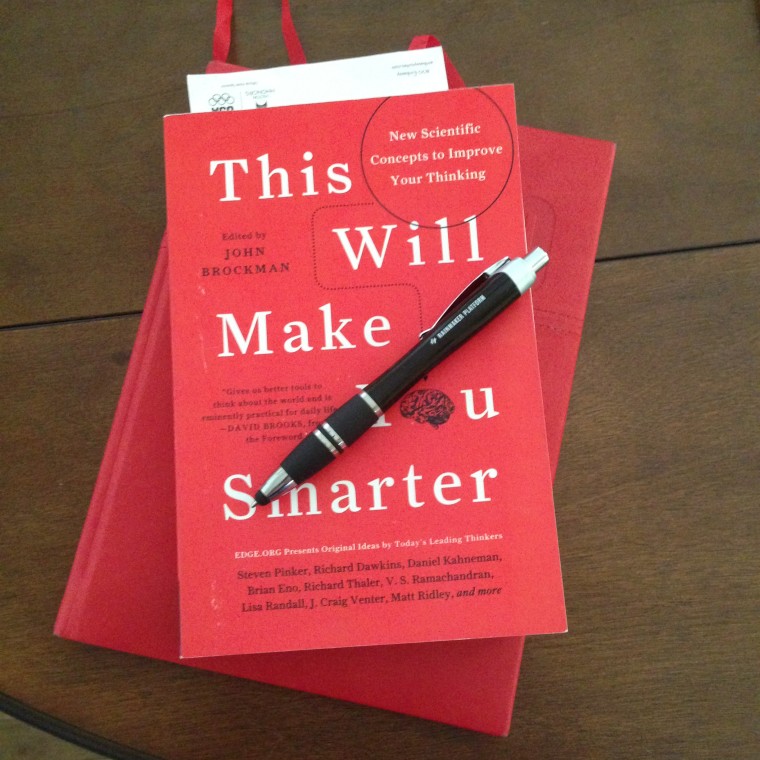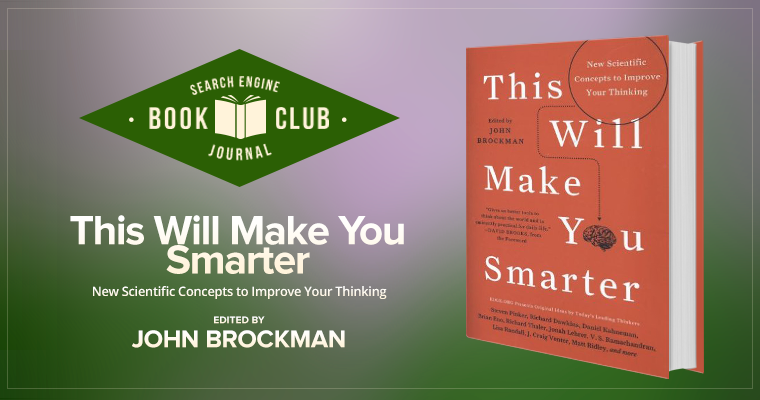Want to see what other books SEJ has covered? Read our other reviews in the SEJ Book Club archive.
I love to read, which means I offer to do the SEJ book club about as often as Kelsey will let me. But, I am not a super big fan of dry business books, so I usually try to pick something a little different that still applies to being an entrepreneur or marketer.
For this month’s book club, I chose “This Will Make You Smarter,” (affiliate link) a collection of ‘stories’ written by some of the world’s most influential thinkers and edited by Edge.org publisher John Brockman.
I hesitate to call them stories, because that isn’t quite the right word. They are more like bite-sized brain snacks of awesome. Each ‘story’ is anywhere from one to seven pages long and details an idea or thought that will change the way you view the world.
Besides blowing your mind, these nuggets of knowledge are short, allowing you to read one or two any time you have a few minutes to spare, which is ideal for busy entrepreneurs and business owners.
You learn something awesome and new without having to set aside a three-hour block of your life. This book is the perfect read for busy people and non-readers alike.
Here are a few of my favorite essays from the book and how they apply to the marketing world.
“Deep Time” and the Far Future by Martin Rees
This story is all about perspective. It is so very easy to get caught up in the day-to-day details of running your life. Deadlines loom, invoices are sent, movies are watched, and we slowly grow older. In this two-page essay, Martin Rees breaks down the perception we have of time and what it means to us.
My favorite quote from his essay is:
Our sun is less than halfway through its life. It formed 4.5 billion years ago, but it’s got 6 billion more years before the fuel runs out. It will then flare up, engulfing the inner planets and vaporizing any life that might then remain on Earth. But even after the sun’s demise, the expanding universe will continue, perhaps forever–destined to become ever colder, ever emptier.
Mic drop.
But What Does it Mean?
Today, being busy is too often seen as a virtue. We get so caught up in the when of life that we often forget the who is what makes life worth living. This applies to both our home life and our business life.
TL;DR It is a lot harder to stress about that deadline when you consider that one day the sun is going to flare up and vaporize the entire earth.
Defeasibility by Tania Lomborzo
Defeasibility is the idea that just about anything can be proven wrong, given additional information. (I am simplifying an entire line of reasoning, mind you. Learn more about defeasible reasoning here.) On its surface, this sounds terrible – basically you can never definitely say something is correct based on this logic. Tania argues this is actually a strength of science.
Recognizing the potential revisablity of our beliefs is a prerequisite to rational discourse and progress. Be it in science, politics, religion, or the mundane negotiations of life.
Or marketing.
But What Does it Mean?
Marketing is constantly in a state of flux, which tends to frustrate many marketers. Which I get – it feels like we are constantly shooting at a moving target. However, we would be well served to keep our thoughts, and our strategies, flexible if we want to be prepared for the next big change.
Black Swan Technologies by Vinod Khosla
A black swan is defined by Nassim Taleb as “an event of low probability, extreme impact, and only retrospective predictability”. In the technology sector examples include the fact that currently more people living in India have access to a cell phone than a toilet or the popularity of people shopping online.
Think back to 10 years ago – could you even fathom where technology is today? No, we couldn’t. Now apply that going forward – imagine where technology might take us in another 10 years. We can’t even begin to think up the awesomeness that will exist.
With a black-swan technology shot, you need not be constrained by the limits of current infrastructure, projections, or market. You simply change assumptions.
But What Does It Mean?
The world is constantly changing, and if we consistently make decisions based on what we think will happen we are likely to miss out on the next big change. The solution? Testing instead of assuming.
Cognitive Load by Nicholas Carr
We’ve all had it happen – you get up from your chair at work to go talk to someone and totally forget what you were going to say. Or you click your LinkedIn profile for something specific, and twenty minutes later find yourself surfing Facebook. Why does this happen?
Because our brains can only hold so many bits of information at the forefront of our mind at one time – somewhere between three and seven (scientists disagree on the exact number).
Why does this matter? Carr explains:
The more aware we are of how small and fragile our working memory is, the better we’ll be able to monitor and manage our cognitive load. We will become more adept at controlling the flow of information coming to us.
But What Does It Mean?
This is an interesting concept for a few reasons. First, understanding how much my brain can handle could help me learn to work more efficiently. From a UX perspective, it could help explain why some designs convert better than others. It also reminds me of the joke about why people turn down the radio in the car when they are looking for a house number. It turns out there is a reason – it helps you focus!
Have you read This Will Make You Smarter? What was your favorite essay in the book?
Join Us Next Month!
Next month, Kelsey Jones, our Executive Editor, will read Smartcuts: How Hackers, Innovators, and Icons Accelerate Success (affiliate link). Pick it up from your local library or from Amazon and read along.
This post contains Amazon affiliate links.
Image Credits
Featured Image: Image by Paulo Bobita
In-post Photo: Image by Danielle Antosz





![AI Overviews: We Reverse-Engineered Them So You Don't Have To [+ What You Need To Do Next]](https://www.searchenginejournal.com/wp-content/uploads/2025/04/sidebar1x-455.png)